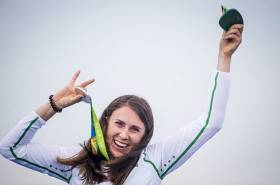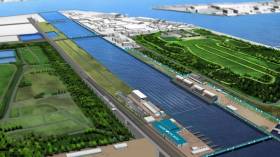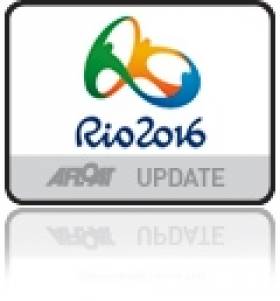Displaying items by tag: Tokyo 2020
Irish Sailing Foundation Honours Olympic Hero Annalise Murphy
#ISF - Rio silver medallist Annalise Murphy is now an honorary member of the Irish Sailing Foundation (ISF) following her incredible Olympic success this past summer.
The announcement comes as the ISF, the new investment support structure for Ireland’s high performance sailing programme, celebrates a year of achievement at every level of competition.
Indeed, Murphy’s medal win wasn’t the only result for Irish sailing in August, with fellow Team IRL members Ryan Seaton and Matt McGovern making their medal race in a final hurrah before their recent split, Andrea Brewster and Saskia Tidey just missing out on their skiff final, and Finn Lynch putting in a strong performance as the youngest in his class in preparation for a medal challenge at Tokyo 2020.
Beyond the Olympics, August was a good month for Johnny Durcan, Fionn Conway and Ronan Walsh, who took second, third and fourth places respectively in the UK Laser Nationals, while Johnny’s twin Harry Durcan, with Harry Whittaker, won the UK 29er Nationals in Torbay, and Tom Higgins sailed the first Irish boat to win the Volvo Gill Optimist National.
Earlier in the summer, there was success for Ireland’s girls in the Topper Worlds at Ballyholme, as Sophie Crosbie, Ella Hemeryck and Jenna McCarlie claimed the podium from gold to silver in that order, though the boys didn’t fare too badly either, with Michael Carroll in fourth and Jack Fahy sixth.
Elsewhere, at the Laser Worlds in Dublin, Nicole Hemeryck — sister of Ella — placed seventh in the U19 girls competition, while Ewan McMahon was second among the boys. Nicole was also second in the under 19s( 13th overall) at the under 21 worlds in Kiel, Germany.
And even earlier in the year, there was a bronze medal for Dougie Elmes and Colin O'Sullivan at the ISAF 420 Youth Worlds in Malaysia, the first ever podium for Ireland in that competition.
Currently all development teams in the Laser, Laser Radial and 49er have moved to Cadiz to escape the cold ahead of January’s annual World Cup in Miami, with further training camps to follow in Spain and Malta in February and March.
But the year isn’t over yet, as Ireland will be represented by Nicole Hemeryck and Johnny Durcan at the Youth Worlds in New Zealand from 14-20 December.
Looking at the longer term, ISA performance director James O’Callaghan will be on hand at a Performance Pathway information meeting at the Royal Cork this Wednesday 30 November where he will discuss, among other things, the results of his recent fact-finding mission to Tokyo.
O’Callaghan was gathering intel on the sailing venue at Enoshima with a view to Team IRL establishing an early base there — identified as one of the keys to Annalise’s medal finish this summer. That will be especially important at Tokyo 2020, where temperatures and humidity will be significantly higher than they were in Rio.
Rowing & Canoeing Look Set To Stay In Tokyo For 2020 Games
#Tokyo2020 - Irish Olympic rowing and canoeing hopefuls look set to stay in Japan’s capital for the 2020 Games as plans to move their venue to a city 400km north are likely to be abandoned.
As Inside the Games reports, Tokyo 2020 organisers are expected to downscale their costly original plans for the Sea Forest in Tokyo Bay instead of moving to the city of Tome in Miyagi Prefecture.
Rowing and canoe sprint were among a number of sports that faced the prospect of their venues being relocated Tokyo to surrounding cities as city officials look to trim rising costs even three-and-a-half years out from the Games.
Inside the Games has more on the story HERE.
#Paralympics - The decision to drop sailing from the 2020 Paralympic Games still stands, following a review of the organisers' controversial move by the ISAF Executive.
Sailing joined seven-a-side football on the chopping block when the International Paralympic Committee (IPC) announced its list of 22 sports for the Tokyo Paralympic Games in five years' time.
It means that next year's Paralympic Games in Rio will be the last time sailors take part for the foreseeable future.
The Irish Sailing Association (ISA) expressed its disappointment with the move "at a time when the development of Sailablity Ireland is more active than ever before."
Indeed, Ireland has been at the forefront of disabled sailing, with multiple-time Paralympian John Twomey holding the presidency of the sport's world governing body, and Kinsale hosting the IFDS Paralympic Worlds in 2013.
There were hopes that the ISAF's review of the IPC's announcement would see the decision overturned - especially following the merger of the IFDS with the ISAF late last year.
But those appear to have been quashed with the conformation that the process to select sports for Tokyo 2020 has officially ended.
The ISAF says it "will continue to work hard to reinstate sailing in the 2024 Paralympic Games and also pursue the slimmest possibility of sailing being included at Tokyo 2020."
The ISAF website has more on the story HERE.































































